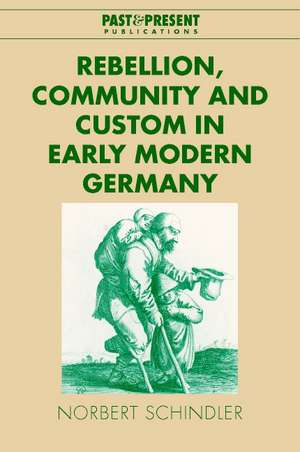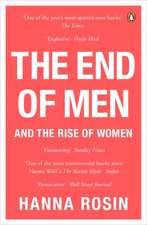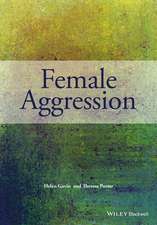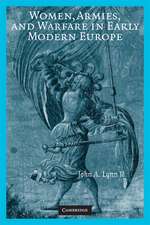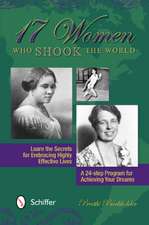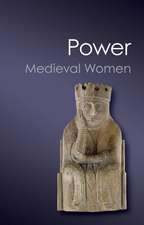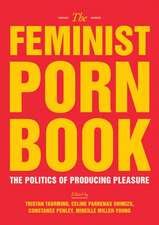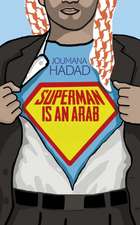Rebellion, Community and Custom in Early Modern Germany: Past and Present Publications
Autor Norbert Schindler Traducere de Pamela E. Selwynen Limba Engleză Hardback – 16 oct 2002
Din seria Past and Present Publications
-
 Preț: 284.51 lei
Preț: 284.51 lei -
 Preț: 335.43 lei
Preț: 335.43 lei -
 Preț: 293.91 lei
Preț: 293.91 lei -
 Preț: 199.93 lei
Preț: 199.93 lei -
 Preț: 193.34 lei
Preț: 193.34 lei -
 Preț: 323.05 lei
Preț: 323.05 lei -
 Preț: 427.55 lei
Preț: 427.55 lei -
 Preț: 334.96 lei
Preț: 334.96 lei - 14%
 Preț: 949.86 lei
Preț: 949.86 lei -
 Preț: 320.55 lei
Preț: 320.55 lei - 11%
 Preț: 580.78 lei
Preț: 580.78 lei - 14%
 Preț: 865.39 lei
Preț: 865.39 lei -
 Preț: 355.76 lei
Preț: 355.76 lei -
 Preț: 432.05 lei
Preț: 432.05 lei -
 Preț: 398.44 lei
Preț: 398.44 lei -
 Preț: 412.82 lei
Preț: 412.82 lei -
 Preț: 273.89 lei
Preț: 273.89 lei -
 Preț: 322.12 lei
Preț: 322.12 lei -
 Preț: 238.52 lei
Preț: 238.52 lei - 14%
 Preț: 874.00 lei
Preț: 874.00 lei -
 Preț: 271.22 lei
Preț: 271.22 lei -
 Preț: 353.87 lei
Preț: 353.87 lei -
 Preț: 323.77 lei
Preț: 323.77 lei -
 Preț: 424.87 lei
Preț: 424.87 lei - 14%
 Preț: 874.50 lei
Preț: 874.50 lei -
 Preț: 241.02 lei
Preț: 241.02 lei -
 Preț: 206.00 lei
Preț: 206.00 lei -
 Preț: 314.99 lei
Preț: 314.99 lei -
 Preț: 272.16 lei
Preț: 272.16 lei -
 Preț: 242.76 lei
Preț: 242.76 lei -
 Preț: 427.47 lei
Preț: 427.47 lei -
 Preț: 445.81 lei
Preț: 445.81 lei -
 Preț: 406.74 lei
Preț: 406.74 lei -
 Preț: 279.67 lei
Preț: 279.67 lei - 14%
 Preț: 780.35 lei
Preț: 780.35 lei - 14%
 Preț: 778.38 lei
Preț: 778.38 lei - 11%
 Preț: 698.50 lei
Preț: 698.50 lei -
 Preț: 375.86 lei
Preț: 375.86 lei -
 Preț: 333.43 lei
Preț: 333.43 lei -
 Preț: 438.56 lei
Preț: 438.56 lei -
 Preț: 269.27 lei
Preț: 269.27 lei -
 Preț: 426.11 lei
Preț: 426.11 lei - 14%
 Preț: 809.89 lei
Preț: 809.89 lei
Preț: 698.50 lei
Preț vechi: 784.83 lei
-11% Nou
Puncte Express: 1048
Preț estimativ în valută:
133.68€ • 139.04$ • 110.36£
133.68€ • 139.04$ • 110.36£
Carte tipărită la comandă
Livrare economică 14-28 aprilie
Preluare comenzi: 021 569.72.76
Specificații
ISBN-13: 9780521650106
ISBN-10: 0521650100
Pagini: 328
Ilustrații: 10 b/w illus. 1 map
Dimensiuni: 161 x 236 x 27 mm
Greutate: 0.64 kg
Editura: Cambridge University Press
Colecția Cambridge University Press
Seria Past and Present Publications
Locul publicării:Cambridge, United Kingdom
ISBN-10: 0521650100
Pagini: 328
Ilustrații: 10 b/w illus. 1 map
Dimensiuni: 161 x 236 x 27 mm
Greutate: 0.64 kg
Editura: Cambridge University Press
Colecția Cambridge University Press
Seria Past and Present Publications
Locul publicării:Cambridge, United Kingdom
Cuprins
Introduction: revisiting the elusive quarry: popular culture in early modern Germany; 1. Habitus and lordship: the transformation of aristocratic practices of rule in the sixteenth century; 2. The world of nicknames: on the logic of popular nomenclature; 3. Carnival, church and the world turned upside-down: on the function of the culture of laughter in the sixteenth century; 4. 'Marriage weariness' and compulsory matrimony: the popular punishments of pulling the plough and the block; 5. Nocturnal disturbances: on the social history of the night in the early modern period; 6. The origins of heartlessness: the culture and way of life of beggars in late seventeenth-century Salzburg.
Recenzii
'Schindler enjoins his readers to look at the past with fresh eyes and to think of and savor its strangeness. His portrait of the multiple practices of the men and women of the artisanal, peasant, and poor classes in the early modern period - their expressiveness, inventiveness, economy, humor, cruelty, helpfulness, and frankness - helps us understand that strangeness in a new way.' Natalie Zemon Davis
'… contains ground-breaking research … In his book Schindler lists such 16th and 17th-century folk activities as the adoption of nicknames, snow fighting, carnival rites and social inversion, marriage customs, the nocturnal habits of the peasantry and the role of the wandering beggar in German witchcraft. Recommended.' The Cauldron
'… stimulating and worth reading.' Journal of Ecclesiastical History
'The series of Past and Present Publications produced by Cambridge University Press has already brought the work of some of the most innovative early modern Germanists to the English-speaking audience. This latest volume is no exception … The book succeeds on several levels … Rich in empirical detail … valuable contributions to a field that, internationally, is still dominated by Anglo- and Francophone scholars.' European Review of History
'… packed with such dense detail, such a vivid evocation of early modern German life and such a plethora of inspiring ideas that it should be read and re-read by all social and cultural historians of early modern Europe.' Journal of Continuity and Change
'… [Schindler] seeks to understand the violence of the past as much as possible on its own terms with attempts to explore the ways in which it made sense to its protagonists.' Historical Journal
'… contains ground-breaking research … In his book Schindler lists such 16th and 17th-century folk activities as the adoption of nicknames, snow fighting, carnival rites and social inversion, marriage customs, the nocturnal habits of the peasantry and the role of the wandering beggar in German witchcraft. Recommended.' The Cauldron
'… stimulating and worth reading.' Journal of Ecclesiastical History
'The series of Past and Present Publications produced by Cambridge University Press has already brought the work of some of the most innovative early modern Germanists to the English-speaking audience. This latest volume is no exception … The book succeeds on several levels … Rich in empirical detail … valuable contributions to a field that, internationally, is still dominated by Anglo- and Francophone scholars.' European Review of History
'… packed with such dense detail, such a vivid evocation of early modern German life and such a plethora of inspiring ideas that it should be read and re-read by all social and cultural historians of early modern Europe.' Journal of Continuity and Change
'… [Schindler] seeks to understand the violence of the past as much as possible on its own terms with attempts to explore the ways in which it made sense to its protagonists.' Historical Journal
Descriere
An evocation of the lost worlds of sixteenth- and seventeenth-century Germans.
